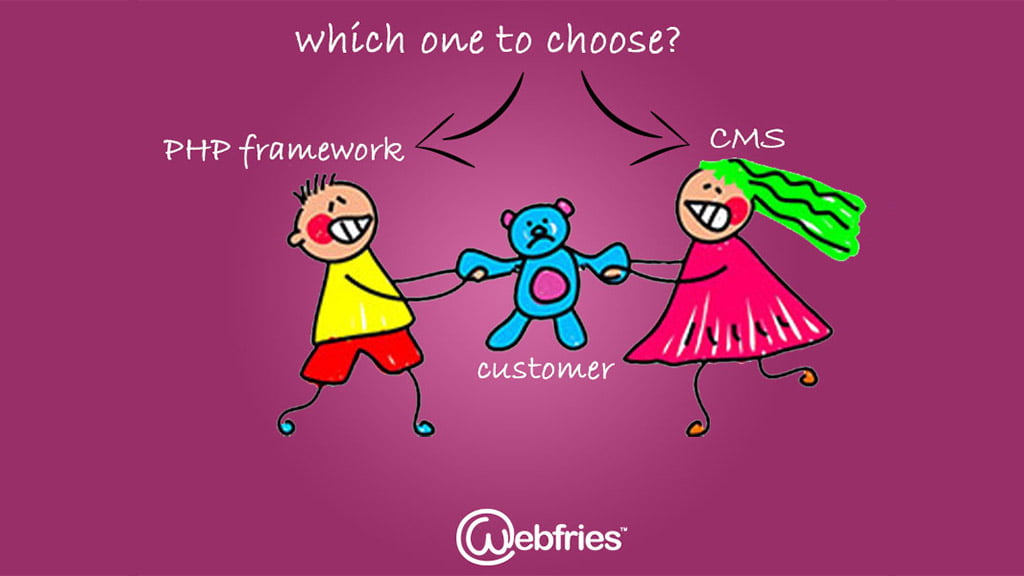While developing a dynamic website you come across the question of what should be the right pick technology for it – CMS or PHP framework. In this blog piece, we have shared what they mean and what are the differences which you must consider while selecting the appropriate technology for your business website.
So let’s begin it by first understanding what does each term mean.
CMS Technology
CMS is an acronym for Content Management System. As the name suggests, it allows the end-user to manage the content on the site. Using the admin dashboard you can do any x, y, z things on the site and that too on your own. Maybe developing a full-fledged website from the scratch can become a tedious task for you however if the website is developed by some professional company, managing it on your own generally remains a cakewalk. From a simple content-driven website to an enterprise E-Commerce platform can be built using a CMS platform. You must have heard the popular CMS options like WordPress, Magento, Drupal, Woo-Commerce, Joomla, etc. CMS world has very strong backing from the digital community, continuous improvements, new versions, etc. are deployed as we are speaking.
PHP Framework
A PHP framework is a bottom-up code written by the developers, it’s a totally customized code written within the pre-defined set of conditions to meet certain objectives. Developers develop PHP modules and complex applications using core library functions. PHP remains the primary programming tool during its development. Since in any application, there can be multiple features, to support and develop that multiple frameworks may constitute part of any complex project. The advantage is that level of customization is quite in-depth however you will need to rely on a developer to get the changes done. It may otherwise look like the Greek language to any normal person. You must have come across PHP frameworks like Laravel, CodeIgniter, Zend Framework, etc.
So that’s all about their definitions. Let’s check what needs to be considered in your case so that you make a wise choice of selecting the right technology for the website.
#1. Security
This has to be the number 1 consideration without any doubt. The online world is growing and so is the vulnerability part of it. Hackers are on a continuous lookout to see the passage to get on your website and change the formatting or in the worst case bring it down. In the CMS segment, developers continuously keep on closing the gaps in the new plugins/ modules they come up with and hackers keep on identifying the gaps. It’s critical that you must use the plugins purchased from reliable sources only. CMS being developed on open source platforms generally is considered more hackable, however, if used wisely you are not likely to see many security threats.
On the other side PHP being custom coded, a security breach isn’t an easy ride for hackers. Frameworks come with inherent encryption that safeguards the site from SQL injections, CSRF, etc.
It is safe to say PHP framework sites are more secure in nature.
#2. Flexibility
CMS websites are quite flexible in the regard that readymade plugins are available, you can stitch on the site easily. For running different functions, plugins are available however in the case of PHP framework sites, it has to be custom coded. Now the question comes does this make CMS-based technology more flexible? Naah, the reason is if some customization is required which is not possible with the plugin, it becomes a task to develop the module from scratch however with PHP it remains a much easier path. PHP also comes very handy while integrating it with some 3PP systems and during API development etc.
PHP frameworks certainly are miles are ahead of CMS in terms of offering flexibility in features offered.
#3. Upgrades
CMS-based platforms are updated quite frequently, actually most of the time on a monthly basis. The reason for such frequent updates is that developers keep on making their plugins more and more secure, build in more features, etc. In the case of PHP frameworks, such upgrades do happen however after long intervals like in 6 months or so.
Not to be missed out, in CMS with the latest updates coming in, it’s important to keep the site as per the latest updates else it gives a chance to the hackers to make an entry as a system becomes a little vulnerable when a website runs on an older version.
It’s totally on the end-user that how much importance is to be given to this point.
#4. UX designs
CMS gives the admin dashboard which is utilized to design any website, it remains quite user-friendly and takes less time to develop any site using it. There are surplus responsive themes available which after some customization can meet your expectations. Modules library and plugins allow you to run the standard functions which you need on the site.
Coming to the PHP framework-based website, you will have to totally rely on the developer to custom made the designs using front-end frameworks. Using the bootstrap framework and CSS designs beautiful designs can be offered.
In a nutshell, life remains slightly easier while developing the user experience with CMS technology.
As a business owner, after reviewing the points above and with a clear understanding of the type of resources available, you would be in a position to make the right call on the technology part. We in Webfries are very competent in developing the sites on CMS as well as PHP framework technology. Our most valuable portfolio is our biggest asset. For website designing and development in Gurgaon, you can call us at +91 124-4379-633. We are also available 24×7 at www.webfries.com.


